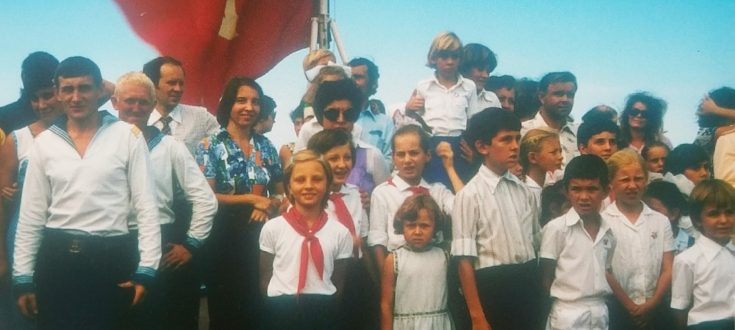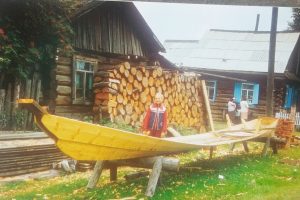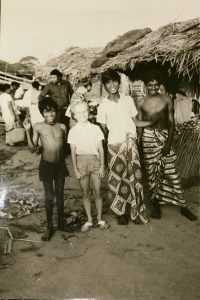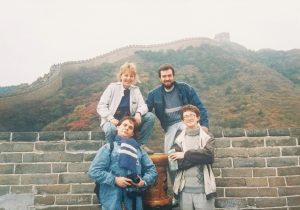From Moscow to Cincinnati | Global Education Matters

Oxana Prokhorova grew up in Moscow, Russia and earned M.A. with Honors in Chinese Studies from Moscow State University. She also holds M.B.A. in International Business from Xavier University. She speaks, reads and writes Mandarin Chinese, English and Russian. She has been successfully working in international trade and multi-cultural business consulting for almost 20 years.
As a Board Member of the World Affairs Council – Cincinnati and Northern Kentucky, Oxana brings a broad global perspective to our work as she sees the power in working together through educating our young people. Currently, Oxana serves as the Director Global Engagement and Chair of the Honors Program at the University of Cincinnati. Here she shares her personal story as well as her thoughts about global education and why it matters.
Growing Up Soviet
I grew up in a very globally-minded family. Both my grandparents and parents were engaged in international trade and diplomacy, traveling across the world and occasionally bringing home some hints of the colorful universe outside of the “iron curtain” – photos, cards, ritual masks, carvings, china. I grew up collecting coins and stamps with writings in unknown languages and depictions of unfamiliar sights and curious places. As long as I have remembered, I’ve always dreamt about traveling to these faraway lands and seeing it all for myself.
 Books and literature were an important part of life, both in our family and in the society. People were judged by the quality and the size of their personal library. International literature was no exception. From Arabian fairy tales to Rumi, Rabindranath Tagore, Saint-Exupery, Kipling, Gabriel Garcia Marquez, Emil Zola… All literature was translated, published, and encouraged to be read, which provided wonderful cultural exposure and often a mental escape from a predictable and mundane daily life in last two decades of the stale Soviet Union.
Books and literature were an important part of life, both in our family and in the society. People were judged by the quality and the size of their personal library. International literature was no exception. From Arabian fairy tales to Rumi, Rabindranath Tagore, Saint-Exupery, Kipling, Gabriel Garcia Marquez, Emil Zola… All literature was translated, published, and encouraged to be read, which provided wonderful cultural exposure and often a mental escape from a predictable and mundane daily life in last two decades of the stale Soviet Union.
Historically, the Soviet Union was a cultural melting pot – on a crossroads between Asia and Europe, a part of the ancient Silk route with trading access to Central Asia and India. Fifteen republics composed the Union and each had its own flag, emblem, language, cultural traditions and holidays. In as early as kindergarten, kids were celebrating cultural diversity with days from the different republic or country, learning facts about language, history, cultural identity, costumes, geography, cuisine. Overall, there was a sense of curiosity rather than distrust about a culture different from our own.
This gave me an early understanding of differences that were interesting to learn and it was enriching. It created the desire to ask questions, learn languages, travel, see a situation from a different cultural perspective, and want to make a difference. As a result, I’ve lived overseas in Sri Lanka, China, USA and traveled the world longer than I lived in my own country!
Global Perspective
When I first arrived in Cincinnati in 1998, I assumed America was composed of millions of immigrants and their descendants who would be equally if not more open-minded about cultural diversity. But somehow all the various ingredients in the stew produced the same standard fast food flavor. I have met many wonderful people with a high level of cultural competence, but I’ve also met too many who think that different equals wrong.
Now more than ever, I find big parts of this society to be cautious, divided, impatient, intolerant to differences, and very angry all while the standard of living is much higher than in the majority of places in the world. The pursuit of happiness is in our constitution and the fabric of the country is a true cultural mix. Why is no one in China offended if I speak Russian or English there; however, here some people take offense even though we have no “official language” in the US?
Being an outsider allows a different look and perspective. Cultural competence is not something we are born with. Like intolerance, it is something we learn as we grow and mature.
 Family plays a fundamental role and so does early childhood education. My own upbringing, in the Soviet system, where cultural studies were introduced early, consistently, and with respect suggests that it was an important component in laying an early solid foundation for cultural competence skills and cultural open-mindedness.
Family plays a fundamental role and so does early childhood education. My own upbringing, in the Soviet system, where cultural studies were introduced early, consistently, and with respect suggests that it was an important component in laying an early solid foundation for cultural competence skills and cultural open-mindedness.
We talk a lot about life preparedness in schools. Technology is changing the life and work landscape, blurring the borders, and connecting everyone through the World Wide Web (no need for visas and border protection). Someone from another culture and country is just a click away. While technical skills and subject knowledge are important, cultural competence and what it takes to develop this complexity is often overlooked or left to an add-on foreign language subject.
We need to be learning about other cultures and the world around us as we are learning to read. And we need to do it now. There must be an integrated interdisciplinary global cultural curriculum starting in preschool and kindergarten and increasing in complexity of cultural components introduced into the curriculum as the child matures. Not only will it allow our children to perform better in the global job market, it will change them for the better. Studying different cultures and customs helps one to understand our own cultural behaviors and implicit bias. Studying real history, not just dates and events, helps one to understand the present, navigate the world problems and change the future. Global learning increases awareness about social issues, critical thinking and is proven to encourage personal social action.
Only Together
At the University of Cincinnati, where I work, time after time I witness students change and grow after a study abroad tour. And as the mind opens to different perspectives, this may help transform our angry psyche to be more tolerant and less fragile. We will be finding better and more harmonious ways to communicate.
 I see many efforts from educators and non-educators alike to introduce global curriculum into K-12 classrooms. It takes a village: the more people will promote it, the sooner it will become a reality. World Affairs Council is one of the pioneers that brings the world to our regional K-12. This work needs to be supported and promoted by community and schools.
I see many efforts from educators and non-educators alike to introduce global curriculum into K-12 classrooms. It takes a village: the more people will promote it, the sooner it will become a reality. World Affairs Council is one of the pioneers that brings the world to our regional K-12. This work needs to be supported and promoted by community and schools.
Our world is becoming increasingly not just interconnected but interdependent. We do not simply work with other countries and in other countries. Our own communities are becoming more and more diverse. Our global problems can’t be solved with a one-sided approach. We are in dire need of a new, young generation of leaders who are possessing the abilities and cultural skills to correctly assess, analyze, and solve domestic, regional and global challenges with a full understanding of historical, cultural specifics and demographic trends. If we learn to respect, value, and utilize our cultural differences and work together for a mutual benefit, we will come up with better, just, and sustainable solutions and we all will live in a more prosperous and safer world.
I want to finish with the quote by one of the first Russian sinologists, a 19th-century scholar, Professor Alekseev, about acquiring another culture: “He is happy who can hold two worlds within.” All it takes is a curious look at someone different than you.


